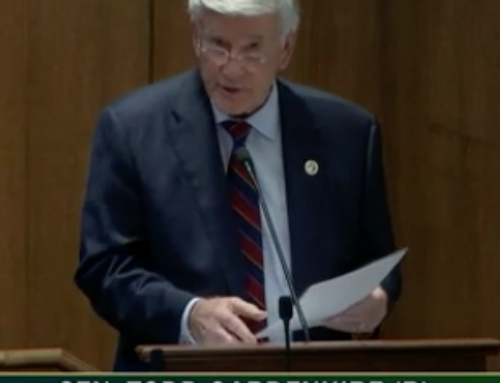Lawmakers to consider bill to temporarily amend Open Meetings Act to allow electronic participation during coronavirus epidemic
The General Assembly did the right thing yesterday in announcing it would not proceed with its regular calendars, and instead focus on just essential business before recessing for at least 8 weeks.

House Speaker Cameron Sexton and Lt. Gov. Randy McNally indicated lawmakers could finish their essential business by the end of the week and go home.
One of those bills under consideration this week would give local governing bodies the ability for their members to meet electronically — such as dialing in on a conference line, or joining via a videoconference. The legislation would also allow local governing bodies to comply with the Open Meetings Act by providing electronic access to the public for its meetings if it decided it needed to bar the public from physically attending because of the public health crisis.
While I’m not sure, as of this writing at roughly 8 a.m. Tuesday, of the exact language of the bill, Tennessee Coalition for Open Government offered potential language that would safeguard open government, be limited for use during this declared disaster and give governing bodies a way to make decisions on essential business. We felt it was our responsibility to point the way in safeguarding transparency and accountability while at the same time recognizing that during this unprecedented disaster, we should not tie the hands of our governing bodies who need to make important decisions for the welfare of our counties and cities.
Here is the language our organization offered as an amendment to the Open Meetings Act. It’s possible this language will be used, or other language. We arrived at this after consultation over the weekend with representatives from the Tennessee County Services Association and Tennessee Municipal League. I was also told yesterday that lawmakers want to add a repeal date for 2021, emphasizing it as a temporary measure:
Proposed bill to allow electronic participation in public meetings during pandemic
Amend T.C.A. § 8-44-108 by adding a new subsection(e)
(e) For purposes of this subsection(e) only, “governing body” refers to all governing bodies as defined in § 8-44-102.
(1) During a declared state of emergency as defined by Title 58, Chapter 2 that involves a natural threat of a disease outbreak or epidemic, a governing body may conduct meetings in the manner established under the provisions of this subsection to protect the health, safety, and welfare of the public and members of the governing body.
(2) A governing body may allow members of the governing body to participate in meetings by electronic means or other means of communication without a physical quorum at the location of the meeting. The governing body’s chair may make an initial determination to allow electronic participation of its members, however the governing body must vote on the determination in its first available meeting and the governing body has authority to deny, suspend or end electronic participation and establish rules for electronic participation that are in addition to the requirements in this subsection.
(3) When a governing body determines that limiting the public’s physical presence at the meeting is necessary to protect public health, safety, and welfare during the emergency, the governing body may comply with the requirements of the Open Meetings Law, codified in this part, by providing the public electronic access to the meeting in accordance with the following provisions:
- Each part of the meeting required to be open to the public shall be audible or visible to the public through an electronic means, which may include TV broadcast on public access channels, radio broadcast of audio of the meeting, live streaming the meeting on the internet or providing a call-in telephone number; provided that the governing body has the technology and capacity during the emergency to provide an electronic means to make the meeting audible or visible to the public.
- A governing body shall make reasonable efforts to acquire technology or capacity to provide the public electronic access to its meeting during the emergency. However, if a governing body determines it does not have the technology or capacity to provide electronic access to meetings, the governing body shall make an audio or video record of the meeting. The recording shall be made available as soon as possible to the public but no later than 48 hours after the meeting.
- A governing body that conducts any meeting in accordance with this subsection (e) shall retain its audio or video recording of the meeting for a period of at least five (5) years.
- The governing body shall make efforts to provide public access to an electronic meeting to the fullest extent possible and is not limited to the methods described in this subsection (e).
- In its discretion, the governing body may take comments from the public or hear testimony from any person during such meetings by telephone or any other electronic method.
(4) The meetings shall comply with the requirements of the Open Meetings Law, codified in this part. Public notices shall state the manner in which the meeting will be conducted and shall provide clear and specific instructions as to how the public may access video or audio of the meeting, as applicable.
(5) This subsection (e) may be used to conduct essential business and may not be used to conduct business that can reasonably be delayed, pursuant to the judgment of the governing body, until after the emergency ceases to exist.
(6) All votes taken during a meeting held pursuant to this subsection (e) shall be by roll call vote, properly recorded in the minutes.
(7) A member of a governing body may participate in a meeting under subsection (e) by electronic participation, provided that the chair of the governing body can verify the governing body member’s identity visually or through other means.
(8) To the extent practicable, any member of a governing body not physically present at a meeting conducted pursuant to this subsection shall be provided, before the meeting, with any documents that will be discussed at the meeting, with substantially the same content as those documents actually presented.
(9) A member participating in a meeting by this means is deemed to be present in person at the meeting for purposes of voting, but not for purposes of determining per diem eligibility. However, a member may be reimbursed expenses of such electronic communication or other means of participation.




